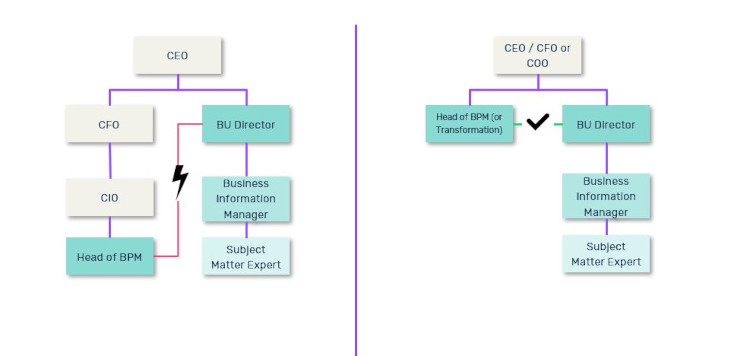The last couple of weeks I delved into the wonderful topic of Management of Change and how organization can look at that. One of the things I described is that there needs to be sufficient mandate for the entity within the organization that is working on this process (you can find this here) and this brings me to the topic I will be focusing on this month: the BPM Center of Excellence. Although this group can bear many names, for example: BPM, Process Management group or Process Excellence group. It can also be part of a larger group that focuses more on business transformation. In this first episode of this months series I will focus on the position of this group.
Due to the nature of the business process being the central vehicle to connect virtually all business artefacts such as applications, risks, activities, roles and other input-output converting aspects, it can be deduced without too much effort that any group that seeks to manage this jungle of dependencies should also be located in a central position. Allow me to explain this.
If we look back into the history of managing business processes and business applications, we have seen a trend that both topics predominantly had their own lives and developments through the organization. The business application side pretty much started in the CIO function and stayed there and in most cases still resides there to be honest. The business process side has had a bit more rocky route, that very often also started in the IT function, very often as a supporting act for ERP implementations, and in many cases transferred to Quality Management in the time that the ISO 9001 norm became widely popular and later also started to be embraced by the likes of risk and audit management and finally as a separate group anywhere in the organization.
For many organizations it has been quite a challenge to position the BPM activities in the best possible spot, first and foremost because most organization do not have the slightest idea of what the best possible spot actually is. A paragraph or two above I already dropped a major hint on where I believe a BPM group should reside within an organization: as a central group, reporting into C- or C-1 level. It does not need to be a separate group, it can be part of a larger group (for example a Transformation Office as we have seen with a number of our customers) as long as it is centrally located and reporting sufficiently high into the executive management. Let's pick apart some of these aspects and explain a bit why I define them the way I do.
However, before I go there, I need to clarify one thing. When I speak about the best possible spot, I do mean the ultimate location where the BPM group should reside once the BPM mindset has been adopted within the organization. This does not mean that when you form such a group for the first time, it should be directly in that organizational location. There is no problem whatsoever if this group starts somewhere else (typically a couple of reporting steps down the ladder, reporting into either IT or Finance or business operations) and slowly works its way into the ideal location. Nevertheless, at the moment that you have reached a certain maturity with BPM, you better be in the right spot, if you want to make it sustainable. Got it? Good, now let's continue...
Let's start by looking at the central aspect. BPM, by nature, is a management discipline that covers all functional domains within an organization. It spans the entire organization from a process point of view, and therefore does not lend itself well to be "owned" by any one functional domain. The same applies to domains like HR, Legal and Auditing, these are independant from the core business and related functional domains and are often (part of) a corporate department. Back in the glory days of BPM in my previous company, the BPM group (known as Process & Advisory Services) belonged to the so-called Expert Center (also containing Legal, IP and Large Capital Projects) and this was exactly the right place to be. Later, this department was dismantled and the BPM group moved to the Global Business Services (read: shared services and IT) and to be frank, that was the beginning of the end. So, in short, it is vital for a BPM group to be located in a central type of department, detached from the day-to-day business. At least, if you expect it to thrive.
The other aspect is the reporting level of such a group. I stated that it should report in to C-level or C-1 level and the reason for that is also quite simple. BPM facilitates and generates such a level of transparency that not all business leaders know exactly how to appreciate and as a result will try to rebel against it. If you BPM group is reporting into C-4, there simply is not enough support to stand up to a C-1 or C-2 business leader that has it out for BPM, for whatever reason. If you remember one of my previous blogs on Management of Change, this exact same phenomenon was discussed and it applies here as well. There will be turmoil and you need a corporate heavy-weight to have your back, because most of the added value from BPM is indirect in nature and thus sometimes difficult to grasp for business leaders that, logically, often have a short term focus (next quarter, next 2 quarters but not longer).

That's it for this week, next week I'll be looking at the roles that you need to form a BPM group in the first place.
Ciao, Caspar


